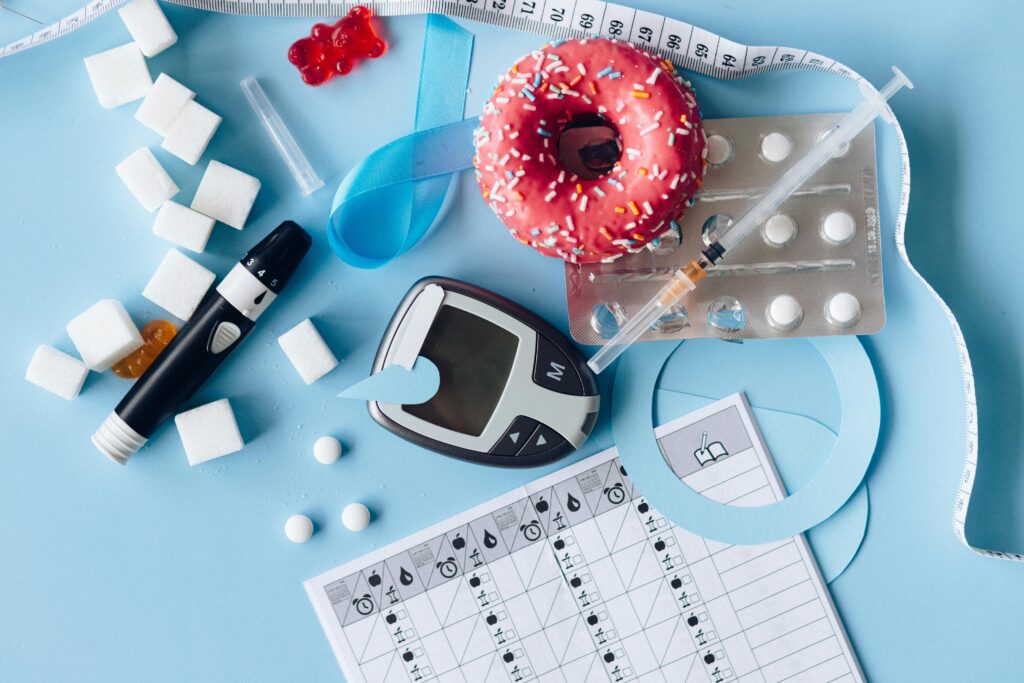Metformin (Glucophage)
Metformin is the most prescribed initial medication for patients with type 2 diabetes, when lifestyle interventions (diet and increased exercise) are not enough to control blood glucose levels (BG).
- How does metformin work?
Insulin is a hormone produced by the pancreas which help movement of glucose from our blood into our cells and tissues. Diabetes mellitus is a disorder in which blood glucose (BG) is higher than normal. This occurs because of insufficient insulin release from the pancreas or improper response of cells to insulin. Metformin works by helping to restore the body’s response to insulin. Metformin decreases the amount of glucose that the liver produces and the intestines absorb.
Metformin is also sometimes used to manage symptoms of polycystic ovary syndrome (PCOS) & prediabetes or insulin resistance syndrome. When patients are placed on metformin, their blood insulin and glucose levels are lowered. It also has a modest effect on reducing appetite and craving for carbohydrates. These actions may cause weight loss. These actions can help prevent type 2 diabetes in patients who are predisposed to it.
- What are some of the benefits of taking metformin?
- Long track record, low cost and relatively safe.
- It does not cause hypoglycemia (low blood glucose levels); unless it is given with insulin or sulfonylureas (such as glipizide or glimepiride)
- May help facilitate weight loss.
- May reduce the risk of dementia or cognitive dysfunction
- In patients with polycystic ovarian syndrome (PCOS), it may restore ovulation and improve patient’s chance of getting pregnant
- May lower the risk of the colon and pancreatic cancer. May reduce the risk of breast cancer recurrence.
- May have antiaging properties
- What are some of the side effects of metformin?
Mild gastrointestinal side effects such as abdominal cramping or diarrhea may occur during the first few weeks in many patients who start Metformin therapy. In most patients, these side effects get better with time. Your physician may ask you to start metformin at a low dose and gradually increase the dose to minimize the GI side effects. Metformin ER (or XR) is a long-acting preparation and is less likely to cause GI side effects. Sometimes switching from Metformin to Metformin ER may enable a patients to take metformin without stomach upset.
Metformin does not cause low blood glucose levels (hypoglycemia) when taken alone. However, hypoglycemia may occur, if the patient is also taking sulfonylureas (such as glipizide or glimepiride), meglitinides (such as Repaglinide or Nateglinide) or insulin.
Long-term metformin use can cause vitamin B12 deficiency.
Metformin does not cause kidney problems or kidney damage. However, if the patient has had kidney problems from other causes, metformin should not be given. Metformin is excreted in the urine and if the kidney is not functioning well, metformin may accumulate in your body and can lead to an uncommon, but serious (& sometimes fatal) condition called lactic acidosis. Lactate acidosis may also when certain other severe health problems, not related to Metformin, are present such as heart attack, advanced liver disease, severe heart failure or hypoxia (low oxygen level). The symptoms of lactic acidosis include nausea, abdominal discomfort, rapid heart rate, low blood pressure and rapid breathing. Lactic acidosis is a medical emergency and should be treated promptly.
- How should you take metformin?
- Usual effective dose in adults with normal kidney: 1000 to 2500 mg daily (most often given twice daily)
- Usual starting dose: 500 mg (1 tablet ) taken after evening meal once a day. If tolerated well, after a few days, the dose is usually increased to 500 mg twice daily. This Can be repeated after week, if the health care provider recommended a higher dose of Metformin.
- When should you hold or not take metformin?
- If you are sick and unable to keep anything down, you may be at risk of dehydration. You should withhold metformin until you are not eating again
- If you are going to have surgery, metformin should be stopped on the day of surgery (for complicated surgery, metformin should not be taken the day before surgery as well) and for 48 hours after. A blood test should be done 48 hours after surgery to confirm that your kidney functions are okay (blood creatinine level) before metformin is restarted.
- Similarly, if you are going to receive intravenous contrast for CT scan, metformin should be withheld for 48 hours, and it is determined that your kidney functions are okay.
- Who should not take metformin?
- Patients with significant kidney disease
- Patients with significant liver disease
- Patients with low blood oxygen level
- Patients with type 1 diabetes (unless given with insulin under the direction of an endocrinologist or experienced physician)
- Previous allergic reaction to Metformin
Post Disclaimer
We are not your healthcare provider, and your use of this website does not establish a patient-client relationship. All the information contained on this website is for informational purposes only. No material on this site is intended to be a substitute for professional medical advice (diagnosis, treatment, testing or nutritional information). Always seek the advice of your physician or qualified healthcare provider with any questions you may have regarding medical or health-related conditions or treatment. Your healthcare provider knows your condition or situation well and can give you specific advice which would be appropriate for your condition/situation. Your healthcare provider can also guide you more accurately about injection techniques, dietary interventions and the use of medical technology that is most pertinent and suitable for you. Please do not disregard professional medical advice or delay in seeking it because of something you may have read on this website.

